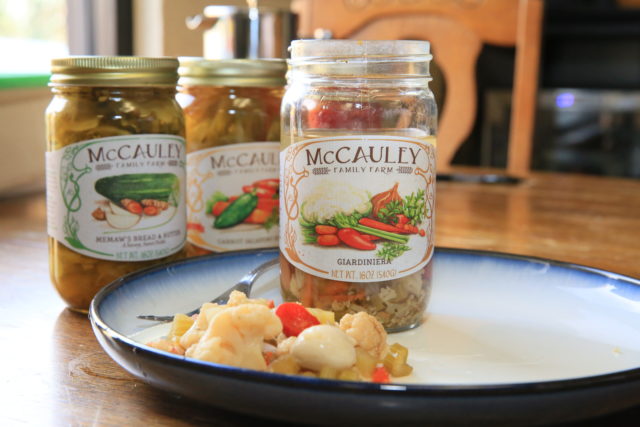
Marcus McCauley doesn’t produce pickles, kimchi and hot sauce as an artisan hobby. The organic farmer and chef is a virtual fermentation evangelist on a mission to save the soil and our guts. To accomplish both goals in the future, we need to go back to our culinary past.
“Our food is dead and full of preservatives. Our ancestors ate living foods — bread, cheese, wine, beer and pickles and grew organically. It was a healthier way to live and the food tasted better,” McCauley says.
When the McCauley family sold their farm in Oklahoma and bought one halfway between Boulder and Longmont six years ago, pickling and fermenting were always part of the plan.
“We had the farmer’s age-old dilemmas: Finding income for the winter and using food we grow that we couldn’t sell. I looked to my background in the kitchen to create products,” McCauley says. McCauley Family Farm grows dozens of organic produce items for a CSA, restaurants, farmers markets and stores.
“The name of our business is Foremother Foods to honor my Mom and Grandma and the other women who passed along the skills to the next generation,” McCauley says.
One part of the company bottles several dozen varieties of pickled local vegetables, including Sweet Bread & Butter Pickles and Giardiniera. McCauley’s most popular items are the yellow Lemon Cucumber Pickles and Dilly Beans. “We will probably pickle 1,600 jars of green beans,” he says. Those are available on the shelf at farmers markets, Lucky’s Market and other stores.
Meanwhile, the McCauley Ferments items including kimchi and tangy, crispy Farm Kraut are only available refrigerated. “Those are alive foods,” he says.
McCauley’s variations on a kimchi theme include Radish Root Chi, Daikon Root Chi and Beet Green Chi. “The nutritious beet greens would have become compost. We rescued them to ferment,” he says.
McCauley supports his fellow local farmers by having them grow the vegetables for pickles beyond what the crew can produce on his family farm.
Then there is McCauley’s miraculous probiotic Picaflor Live Culture hot sauces, which are now available refrigerated in 12 states.
“It gets its richness from natural fermentation. We make umami by the barrel. The peppers from our farm just sing; they are really amazing and sweet,” McCauley says. The farm saves Colorado-seasoned seeds for planting the following year.
He bottles Picaflor Live Culture’s three varieties in a Boulder commercial kitchen. The yellow Boulder Sol sauce includes organic criolla sella peppers, garlic and cantaloupe. The red Srirawcha sauce is made with organic cayenne and Portugal peppers and local honey. The green Vida Verde sauce features organic jalapenos and garlic with Colorado applesauce for sweetness and texture.
Instead of composting the residual chile seeds and skins, they are dehydrated and offered as fermented hot pepper flakes for use on pizzas and everything else edible.
“Regenerative farming practices really matter. We are always working to return carbon into the soil and you can taste the result in the produce. It has an ecological and economic impact. Food preservation completes the loop by using everything the soil produces,” McCauley says.
McCauley wants you to follow in his pickled footsteps as a gut-health alternative to probiotic supplements.
“Fermentation is safe and easy, and I really encourage everyone to try it at home. Go ahead and experiment with different vegetables. It gives you a living, breathing colony of microorganisms that produce great flavors. You can even use our hot sauce to inoculate your pickles,” he says.
How to Re-pickle: Don’t toss that leftover pickle juice once you eat the last gherkin! Garden & Gun magazine suggests using the juice in the jar in dirty martinis, as a chicken marinade, in making mayo, in dressings instead of vinegar, as a tasty shot for alleviating muscle cramps and for cleaning the surface of a grill. I add various par-cooked veggies to the juice and end up with a jar of tastiness in the fridge.
Local food news
Boulder Food Rescue hosts its sixth annual Feast Fundraiser Sept. 14 at the Boulder JCC featuring Indian fare plus appetizers and desserts created from some of the 1,600 pounds of fresh produce that the non-profit saves every day and distributes by bicycle-pulled trailers. boulderfoodrescue.org … The French Quarter Brasserie has closed at 1207 Pearl St. after only a year in business. … Boulder-based Big Red F will open Jax Fish House and Post Brewing outposts in the terminal at Denver International Airport in 2019. By the way, TSA rules allow you to have fried chicken in your checked or carry-on bag but not gravy. … Masonville Orchards grows more than 200 varieties of apples and pears that are available at local farmers markets, but the Ault-based farm also has a U-pick orchard open 9 a.m. to 4 p.m. Saturdays and Sundays. masonvilleorchard.com. … Plan ahead: First Bite Restaurants, Boulder County’s restaurant week, offers three-course, $34 meals Nov. 9-17 at notable local eateries. firstbiteboulder.com.
Taste of the week
I’ve loved pickled beets since I was a kid. McCauley Family Farms produces perfectly simple pickled red beets that are less sweet, firmer and far more flavorful than commercial beet brands. The magenta roots are grown locally by Aspen Moon Farm. The break-out star of the farm’s lineup is Picaflor Live Culture Srirawcha Hot Sauce. The bright red refrigerated sauce includes organic cayenne and Portugal peppers grown on the McCauley farm and local Highland Honey. The taste is rich and nuanced, not harshly hot or acidic, with an appealingly smooth texture. It’s highly recommended.
Words to chew on
“Salt is one of our greatest culinary gifts, an incomparable condiment, an everyday necessity, and perhaps the most precious and invaluable of our kitchen staples. It goes into all our foods, even desserts, for a pinch in a cake batter, a pie crust, or the poaching syrup for fruit adds immeasurably to the finished product.” — James Beard
John Lehndorff is a prep cook. Listen to Radio Nibbles podcasts: news.kgnu.org/category/radio-nibbles.














